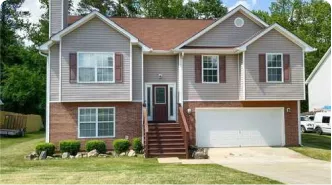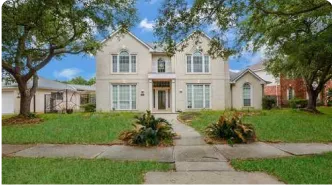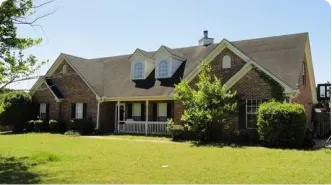Real estate investors need to know the exact rental property management fees charged by professionals to choose the best way to manage their long-term rentals. The average property management fee for rental properties is between 8% and 12% in the US market, but this is not enough to know if hiring a professional manager is worth it.
In this article, we will look into the services that property managers provide and a breakdown of the fees that they charge. These include both recurring monthly fees and different additional charges as need arises. We’ll also discuss how management fees are calculated and paid. Ultimately, we will aim to decide whether the fees are worth it for landlords.
Let Awning find the best property manager for your rental property. Simply fill out the form and Awning will find a property manager that provides the best rates and services for your property.
What Rental Property Management Fees Are
Rental property management fees refer to the amount of money that a landlord pays to a professional property manager to take comprehensive care of their long-term rental property. This is a monthly charge that depends on the market, the property type and size, the services included, and the company itself.
While it seems that real estate investors are voluntarily giving up a part of their income, hiring a rental property management company brings many important benefits. First of all, as professionals within the industry, in most cases property managers are able to optimize the performance of the rental property and boost property revenue. Even more importantly, they give investors access to passive income and allow them to invest remotely. This is particularly beneficial for those living away from the best cities to buy a rental property.
Average Property Management Fee for Rental Properties
The average property management fee for rental properties in the US market is in the range of 8% to 12% of monthly rental income. There are some managers that charge as little as 6% and some that go as high as 14%, but the average rate hovers around 10% of revenue.
Anything under 8% sounds suspicious. There is a lot of active work that goes into the management of a long-term rental property, and it’s doubtful that even a large-scale property manager can deliver the expected services with the required quality for less than 8% of income. Meanwhile, a rate above 12% might be excessive.
The best property management companies have multiple rentals under their umbrella, so they should be able to generate good income for themselves when charging up to 12% of revenue.
One thing you should keep in mind is that most property managers do not list their fees on the company website, so you would need to get in touch with them and ask for this explicitly.
Typical Rental Property Management Costs and Fees
There are two main rental property management fee structures in the US market:
Rental Property Management Costs as Percentage of Income
This is by far the most popular pricing model for long-term rental property managers. Under this structure, companies charge a percentage of the monthly rental revenue for managing a property on behalf of the owner. In this way, they have an incentive to improve the performance of your property as this will increase their income too.
The average rental property management fee in this scenario is between 8% and 12% of income.
Flat Rental Property Management Costs
Few property managers charge a flat, or fixed, monthly fee. The size of the fee depends on the market, the property type, the number of bedrooms, and the company. The typical range is around $100-$150 per month. While this sounds like less than what you would pay under the first pricing model, keep in mind that companies that get paid a flat fee are not motivated to work on enhancing your rental. No matter how much income you get as a landlord, they will receive the same amount.
Service Included in Rental Property Management Costs
Most property management companies cover the same basic set of services for real estate investors. The services included in the monthly management fee are:
- Setting up the best rental rate based on market trends and property size
- Creating and distributing an optimized rental listing
- Listing marketing and advertising
- Tenant screening and interviewing
- Drafting a comprehensive, law-compliant lease agreement
- Onboarding tenants
- Collecting rent
- Inspecting the property
- Maintaining the rental
- Managing financial matters
- Increasing rent (when needed)
- Reporting to the property owner
Additional Costs for Rental Property Management
Sometimes the typical property management services listed above are not enough to ensure the smooth running of a rental business. That’s why property managers need to cover some additional services. In most cases, those are charged separately to reflect the extra work.
Additional services and costs include:
- Renovation: The best rental property management companies provide renovation services to help properties get more attractive and generate more rent. The cost of this service can vary widely, depending on the current state of the property and the expected final result. In any case, it will be a few thousand dollars.
- Property onboarding and setup: Some rental managers charge a one-time fee to onboard the property and the owner and to make sure that the rental is ready to welcome tenants. This is usually a few hundred dollars.
- Tenant placement: Many property managers charge a fee to market your rental, find a tenant, and get them moved in. The standard rate is the equivalent of one monthly rent.
- Inspection: Some rental property management companies charge an extra fee for inspecting your property, usually twice a year. If this is the case, you need to make sure that they ask for a lower monthly fee.
- Maintenance: While the inspection and coordination of repairs is typically included in the monthly management fee, landlords need to cover the actual cost of fixes. There is no way to avoid this expense, whether you’re a DIY landlord or hire a professional manager. A good annual estimate is 1.5 times the monthly rental rate.
- Lease renewal: Some companies charge additionally to renew the lease when it expires, which usually happens annually. The fee should be less than one monthly rent.
- Late-rent collection: If a tenant is late with the rent payment, the manager will go after them to collect the late rent. However, they will charge you a fee for this service, usually about 20%-50% of the collected amount.
- Vacancy: Some rental management companies charge a fee when they take over a vacant property. The typical value is one month worth of rent.
- Eviction: In case a tenant needs to be evicted, property managers charge an eviction fee although it’s most likely their fault that this tenant was placed in your property, to begin with. However, this saves you a lot of legal work and trouble as you don’t have to manage the eviction yourself. Be ready to pay around $500 or more should this happen.
- Early termination: In most cases, your rental property management company will make you pay a penalty fee if you want to get out of contract before the expiration date. The management contract termination fee depends on the agreement and the remaining time, but it usually starts at one monthly rent.
Before opting for working with a property manager, you need to get a detailed list of the exact rental property management fees that you will need to pay for, both monthly and on an ad hoc basis.
How Rental Property Management Companies Determine Fees
The average rental property management fee is usually between 8% and 12% of monthly income, and the exact percentage depends on a number of different factors.
When determining their fees, property managers consider the following:
- The market: Landlords in larger cities and metro areas can expect to pay more due to the higher cost of living in their location.
- The area: Neighborhoods that are considered better and safer for living bring in good tenants that cause zero problems to property managers. Thus, they are willing to accept lower payments for managing rentals in top areas.
- The property type: Single-family homes and townhomes usually incur higher management fees because of the additional square footage and areas.
- The number of bedrooms: Properties with more rooms may have lower management fees as the rental income is higher, so the manager income will still be good.
- The state of the property: A well-maintained property requires little extra work and attracts quality renters, so the associated fees are less.
- The included services: The more rental property management services a company covers, the higher rates it will charge.
- The property management company: Small local managers usually charge a higher percentage of income because they provide properties with a more personal approach and because they lack economies of scale. Meanwhile, large nationwide companies are able to charge less but deliver more standardized services.
- The rental income: When a property is expected to generate a lot of monthly income, the manager is likely to accept a smaller percentage of it.
- The occupancy/vacancy: Properties in markets that are notorious for suffering from high vacancy rates might have higher fees to compensate for the additional marketing and advertising work that the manager will need to do.
How Rental Property Management Fees Are Calculated
In most cases, the property management fees for long-term rentals are calculated as a percentage of the monthly gross rental income. Landlords and property managers agree on the exact rate beforehand, include it in the management agreement, and sign the contract before getting started.
Let’s look at an example. The fee is equivalent to 10% of monthly rent (the average rate in the US market). If a property is rented out for $2,500 per month, and a parking space is rented out separately for $300/month, then:
Rental Property Management Fee = 10% of Gross Rental Income
Rental Property Management Fee = 10% x ($2,500 + $300)
Rental Property Management Fee = $280
The monthly management fee is calculated on the gross rental income.
On top of that, property owners should add any additional costs incurred during the month, such as repair works, late-rent collection, and vacancy.
In case you pay a flat fee, then the monthly management is equivalent to the amount you’ve agreed on with the manager plus extra charges incurred during the specific month.
How Rental Property Management Fees Are Charged
The management fees for rental properties are usually paid on a monthly basis, at the end of the month. In most cases, property managers are responsible for collecting rent, so they simply deduct their total fees for the month from the gross rental income. Afterwards, they transfer the remaining amount as a payout to the property owner.
It is a must that each month the management company provides a clear, detailed report with the rent that is collected, the costs that are incurred, and the fees that are charged.
How to Negotiate the Best Price for Rental Property Management
Before you start looking for the best rental property management company for your needs, you should know that most of them don’t publish their management fees on their websites. This leaves plenty of leverage for you to try to negotiate a good rate. Since the average range is 8%-12%, you should always aim to get around 8%.
Here are a few proven strategies to get the best possible rental property management fee:
- Check different property managers: You need to shop around and research several rental property management companies. It is a mistake to go for the first manager that you come across as they might not be offering the best value for money in your market.
- Use referrals: Ask other investors that you know or participate in online real estate forums to be referred to the top property manager in your area. Fellow landlords are likely to know who offers the best combination of services and fees. Moreover, you might get a discount for being referred by someone they are already working with.
- Consider both local managers and large companies: Check out a few small-scale managers as well as a number of large, national companies. They have very different management styles and charge different fees.
- Read online reviews: Before approaching a property manager, see what other landlords say about them. One of the best ways to find honest experiences and opinions are third-party online review websites like Trustpilot, BBB.org, Yelp, and others.
- Show serious interest: After you like a few possible property management companies, talk to them and show them that you are ready to get started as soon as you see a good offer. They might be willing to lower their fee in order to get you onboarding right away.
- Cover some services: If you invest close to home, you can be responsible for some of the property management tasks. Being personally involved in the management of your property might boost results, and it might also bring down the monthly management fee.
- Negotiate the fee: You should not hesitate to try to directly negotiate the fee with the property manager. Inform them that you have other options on the table as well, and that you will choose the company that gives you the best rate. You can mention that others are ready to offer you a lower fee if this is the case.
- Negotiate the services: If the company you are leaning towards is not willing to lower their management fee, you can try to negotiate the services that are covered by them. Show that you are happy to pay their fee if they add a few more things to the package.
- Demand a discount for multiple rentals: If you own a few long-term rental properties that need management, ask for a discount. Most managers will give you a better rate for 2+ properties.
Are Rental Property Management Fees Worth It?
In most cases, property management fees are worth it. 10% of your rental income sounds like a lot, but it could be a good deal. Many landlords see an improvement in occupancy and rental income after hiring a company to take care of their property. Because property managers know the industry and have access to vendor discounts, they are able to generate more revenue and incur lower operating costs. The overall result is enhanced income and higher cap rates for investors.
In addition, you should not underestimate the importance of passive investing. If you don’t have to deal with the day-to-day demands of running a rental business, you can put more effort into adding new properties to your investment portfolio.
Takeaway
Landlords can expect to pay average rental property management fees equivalent to 8%-12% of monthly rental income. Despite the sizable amount, property manager fees are worth it as they provide improved long-term rental property management as well as passive real estate income. Nevertheless, before hiring a company, make sure to shop around, check out various options, choose the manager that fits your needs the best, and negotiate the fee.
.svg)






.webp)







%201.webp)
%203.webp)



%201.webp)
.webp)



%20(1).webp)
